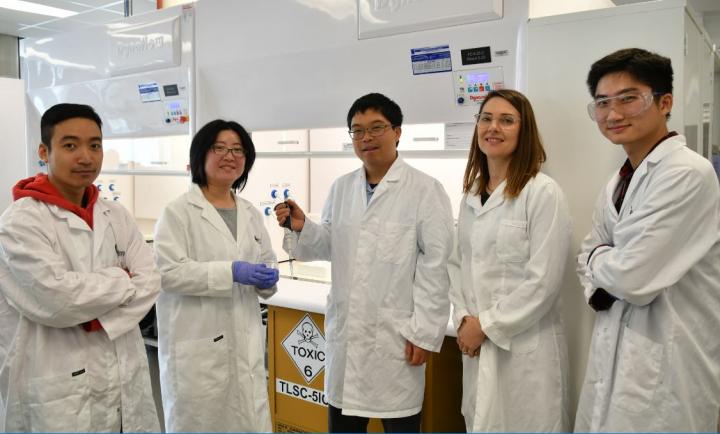Bioprobe tests favour AIEgen technology

Credit: Flinders University
In the pandemic age of telehealth and new technologies, remote site lab or point-of-care (POC) testing of biofluids is a potentially rapid and non-invasive way to test for most diseases – including COVID-19.
Now scientists at Flinders University have run tests on the bioprobe industry, recommending the potential of a novel group of bioprobes with aggregation-induced emission (AIE) properties, so-called AIEgens, as being the best way forward to deliver accurate clinical biomarkers.
Every drop of bodily fluid, or biofluid, holds valuable clues to a person’s health. The bioprobe industry is rapidly responding to the rising need for fast screening and early detection of diseases via biomarkers in saliva, blood, urine or sweat samples.
In a new journal article, the researchers recommend rapid and widespread rollout of low-cost, accurate AIE bioprobe applications which can pick up disease biomarkers in very low concentrations.
“AIE bioprobes with portable device are an exciting new method for detecting biomarkers in bodily fluids,” says Flinders University Professor Youhong Tang, from the Australia-China Centre for Personal Health Technologies.
“Increasingly, these low cost and convenient technologies will help raise health servies in rural areas and developing countries.
“This technique can be easily enhanced by commonly available wearable devices such as smartphone data capture and analysis, and data cloud storage,” he says.
Several applications of AIE bioprobes, such as paper-based strips and POC devices, are currently under development, and offer potential to be realized simply by use with smartphone data capture and analysis and data cloud storage.
These low-cost and highly reliable AIE bioprobe applications are beneficial for both early detection of disease and chronic disease management, and may facilitate greater involvement of health care consumers in managing their own care.
“We need to accelerate AIEgen sensor development for bodily fluids and the development of corresponding analytical and portable devices,” says Xinyi Zhang, lead author on the new Materials Chemistry Frontiers article.
“As well as rapid diagnostics, it can also facilitate greater involvement of health care consumers in managing their own care, leading to greater benefits to more people at lower cost to the system.”
The Medical Device Research Institute at Flinders University is at the forefront of developing point of care devices using this technology, says Carolyn Ramsey, director of the Australia-China Centre for Personal Health Technologies.
“As well, our partners at Nankai University in China are developing an AIEgen technology to diagnose COVID-19,” she adds.
The Australia-China Centre for Personal Health Technologies is a multidisciplinary initiative in medicine, chemistry, biotechnology, engineering and digital health research led by the Flinders University Medical Device Research Institute. La Trobe University, Motherson, Nankai University, South China University of Technology and Shandong Computer Science Centre are partners in the centre.
AIEgen Luminogens for specific biomarkers – e.g. albumin, a protein produced in chronic kidney disease – works by lighting up (or fluorescing) in response to the amount of biomarker present in a person’s bodily fluid.
###
The new article ‘Detection of biomarkers in body fluids using bioprobes based on aggregation-induced emission fluorogens’ (2020) by Xinyi Zhang, Bicheng Yao, Qi Hu, Yuning Hong, Angus Wallace, Karen Reynolds, Carolyn Ramsey, Anthony Maeder, Richard Reed and Youhong Tang has been published in the Materials Chemistry Frontiers DOI: 10.1039/D0QM00376J https:/
Media Contact
Xinyi Zhang
[email protected]
Related Journal Article
http://dx.




